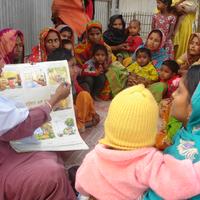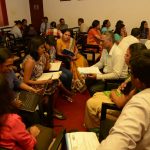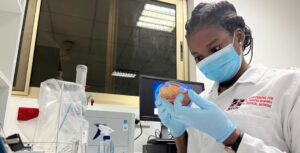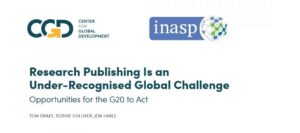
Study shows more women seeking healthcare in Bangladesh
Empowered women take better decisions and make better life choices for themselves and their families. They also help to reverse traditional societal gender-based injustice. Seeking healthcare proactively or participation in decision making on issues related to them and their family is an important indicator of women’s empowerment. And, improving healthcare access for girls and women is one of the targets within the UN Sustainable Development Goals – gender equality and empowerment of all women and girls – adopted in 2015.
A recent study published in South East Asia Journal of Public Health available online on Bangladesh Journals Online, supported by INASP, analyses women’s empowerment in Bangladesh in terms of health-seeking behaviour.
The study conducted by Md. Nazmul Hasan and Prof. M Sheikh Giash Uddin of Jagannath University in Dhaka, Bangladesh has found an improving trend in women’s empowerment, particularly in terms of health-related decision making.
According to the article, about two-thirds of the Bangladeshi women took their and their children’s healthcare decisions alone or jointly with their husbands. The analysis was done based on the data of Bangladesh Demographic and Health Survey (BDHS) 2011.
“It is very pleasing that the condition of women, their health seeking behaviour and access to health has undergone a paradigm shift over the past few decades,” says Dr Md. Anwarul Azim Majumder, Executive Editor of the journal.
This is a growth compared to another study in 2007 conducted by Bangladesh’s National Institute of Population Research and Training (NIPORT), which showed that 55.8% women made their own healthcare decisions and 64% made decisions about their children’s healthcare.
The study titled ‘Women empowerment through health seeking behaviour in Bangladesh: Evidence from a national survey’ found that women’s age, education, their husband’s education, urban or rural domicile, working status and affiliation to non-governmental organizations (NGOs) had a significant impact on women’s empowerment.
Women aged 30-39 were more than twice as likely to seek their own healthcare and three and a half times more likely to seek children’s healthcare compared with women younger than 25 years of age.
“Education plays a role in women’s empowerment. These days, more women are being educated. The female: male ratio in schools and colleges is increasing,” explains Dr Majumder. “As a result, more women can be seen in the workplace these days. They get salaries and contribute to the family. They can take decisions in their own and family matters.”
Dr Majumder shares, “the present generation is far ahead in education compared to the older generation. If I take my own example, my grandmother and aunts were not educated, but all my female cousins have graduate degrees.”
While there is still a lot that needs to be done in some areas of public health such as efficient communication, Dr Majumder credits the improvement in public health in the recent years to government programmes and non-governmental and private sector programmes that include awareness raising, promotional campaigns and health camps.
He says, “the government has also carried out many awareness-raising programmes for girls in towns and villages. Many health indicators have improved over the years.”
The article ” Women empowerment through health seeking behaviour in Bangladesh: Evidence from a national survey” by Md. Nazmul Hasan and M Sheikh Giash Uddin of Department of Statistics, Jagannath University, Dhaka, Bangladesh appears in South East Asia Journal of Public Health, Vol.6(1) 2016 (pages 40-45) . The article is made available online via Bangladesh Journals Online (BanglaJOL) platform, which is part of the Journalss Online Project supported by INASP.
About the Journal
South East Asia Journal of Public Health (SEAJPH) is the official journal of the Public Health Foundation of Bangladesh. It is a biennial publication that started publication in 2011.
About BanglaJOL
BanglaJOL is a database of journals published in Bangladesh. It was initiated in June 2007 and officially launched in September 2007 with the support of the INASP. The objective of BanglaJOL is to give greater visibility to the participating journals, and to the research they convey. It is managed locally by the Bangladesh Academy of Science (BAS). It provides open access to the full text of research articles published in 139 different journals from a wide range of academic disciplines and genres.
About INASP
Founded in 1992, INASP is an international development organization working with a global network of partners in Africa, Latin America and Asia. In line with the vision of research and knowledge at the heart of development, INASP works to support individuals and institutions to produce, share and use research and knowledge, which can transform lives.
INASP’s approaches are based on the core pillars of capacity development, convening, influencing and working in partnership. INASP promotes equity by actively addressing the needs of both men and women across all our work and addressing issues of power within the research and knowledge system. INASP has projects in 28 countries, supporting all aspects of research and knowledge systems, from facilitating the provision of information to researchers to helping parliamentarians and civil servants to use research and evidence in policy making.
Disclaimer: Research published in journals hosted on the BanglaJOL platform is selected by the journals in accordance with their own editorial processes and criteria. INASP and BanglaJOL provide hosting and guidance on good practices but are not involved in selection of research.
For further information
Thakur Amgai, Communications Consultant, INASP
Email: tamgai@inasp.info
Dr Sangita Shrestha, Communications Officer, INASP
Email: sshrestha@inasp.info

 Previous Post
Previous Post


